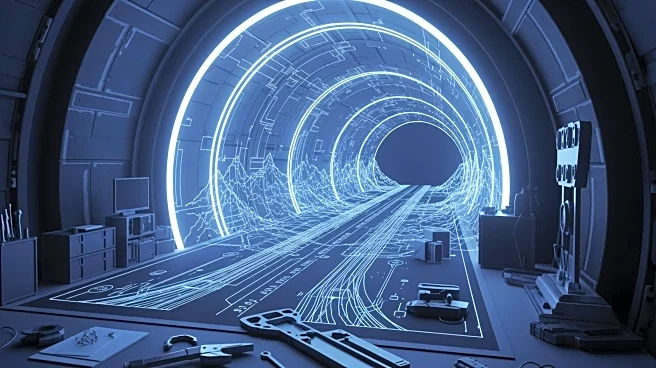What's Happening?
The Kremlin has revived an old idea of constructing a tunnel across the Bering Strait to connect Russia and the U.S., specifically Alaska. Kirill Dmitriev, CEO of the Russian Direct Investment Fund, tweeted the proposal, suggesting Elon Musk's involvement
due to his tunneling technology. Dmitriev claims that Musk's Boring Company could reduce the traditional costs of such a project from over $65 billion to less than $8 billion. President Trump, when asked about the proposal during a meeting with Ukraine's President Volodymyr Zelenskyy, called it 'interesting' but noted he hadn't heard of it before. The feasibility of the tunnel remains theoretical, with Musk's previous tunneling projects often falling short of initial promises.
Why It's Important?
The proposal highlights ongoing diplomatic maneuvers between Russia and the U.S., potentially impacting geopolitical relations. If realized, the tunnel could symbolize unity between the two nations, affecting trade and travel. However, the involvement of Elon Musk, known for ambitious yet often unfulfilled projects, raises skepticism about the project's viability. The idea also surfaces amid tensions related to the Ukraine conflict, suggesting possible strategic distractions or diplomatic gestures by Russia. The proposal's acceptance or rejection could influence future U.S.-Russia relations and economic collaborations.
What's Next?
While the tunnel project remains speculative, its discussion could lead to diplomatic talks or negotiations between the U.S. and Russia. President Trump's response indicates potential openness to exploring the idea further, depending on political and economic considerations. The proposal might also prompt reactions from other stakeholders, including environmental groups and international bodies, given the project's scale and implications. The geopolitical context, especially concerning Ukraine, will likely influence the project's progression or dismissal.
Beyond the Headlines
The tunnel proposal raises questions about the ethical and environmental implications of such large-scale infrastructure projects. It also reflects Russia's strategic use of grand ideas to engage with U.S. leadership, potentially diverting attention from ongoing conflicts. The historical context of similar proposals, like the Kennedy-Khrushchev World Peace Bridge, underscores the recurring theme of using infrastructure as a diplomatic tool. The project's discussion may also impact public perception of U.S.-Russia relations and influence future diplomatic strategies.















